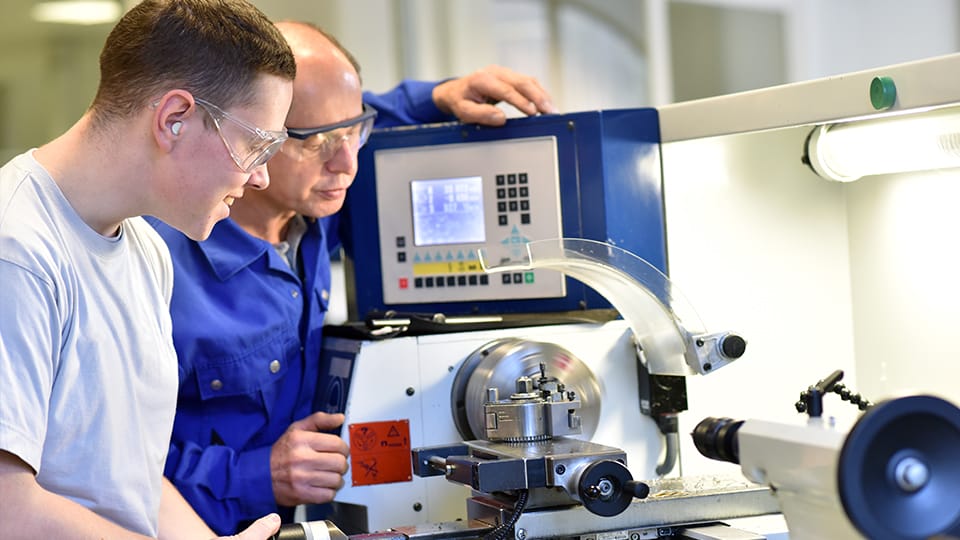Indiana coalition rolls out plan to develop up to 50K high school apprenticeships
Subscriber Benefit
As a subscriber you can listen to articles at work, in the car, or while you work out. Subscribe Now
A group of nearly 200 Hoosier leaders released a plan Tuesday to develop a statewide apprenticeship-pathway program for potentially tens of thousands of high schoolers to work in four key industries.
The employer-led initiative, called the Indiana Apprenticeship Pathway, aims to bolster the state’s efforts to improve education outcomes and build a more capable workforce. A core component of the proposed workforce preparedness program is to increase the availability of apprenticeships and develop an ecosystem of employers and industry stakeholders to offer such opportunities to high schoolers.
The coalition behind the plan is called the Center on the Economics and Management of Education and Training Systems Implementation Laboratory, or CEMETS iLab Indiana, for short. It is supported by the Richard M. Fairbanks Foundation. The group of leaders—made up of business, K-12 education, higher education and government officials—has worked on building Tuesday’s plan since December.
“The No. 1 objective that we have to do in creating this new pathway is for industry to organize around its talent needs through those new talent associations that is then going to enable every community in our state to be able to help students choose this pathway and get the education training they need to be successful in their careers,” said Claire Fiddian-Green, co-chair of CEMETS iLab Indiana as well as Fairbanks Foundation CEO and president.
The goal of establishing 50,000 apprenticeships by 2034 is very possible, Fiddian-Green said.
The initial iteration will focus on banking, health care, life sciences and advanced manufacturing. The first occupation pathway—likely banking, since there is existing infrastructure—could debut as early as the 2025-26 school year.
Those four industry sectors are a starting point since they have existing talent shortfalls and sector leaders in support, Fiddian-Green said. The goal is for each occupation to begin hiring students for apprenticeship programs by the end of 2026, according to the plan.
Students would begin receiving career advising as early as middle school. Once students reach their junior year in high school, they can begin apprenticeships while taking both traditional and career-aligned classes and earning credentials recognized by employers. Afterward, students could pursue further degrees or switch tracks to attend college.
“It’ll be a tremendous boost to the students in Indiana, to their families, to the businesses, to the state as a whole,” said David Becker, co-chair of CEMETS iLab Indiana and chairman and CEO of First Internet Bank. “We’re almost at a crisis situation of not having enough qualified people for the opportunities here in Indiana, and I think this program has a real, real opportunity for us to meet that.”
The apprenticeship program comes as the state is redesigning its high school diplomas to offer more opportunities for career development, specifically work-based learning experiences in addition to traditional college prep.
Schools can opt into the apprenticeship program, which fits into the diploma proposal’s readiness seal for the employment track.
Fiddian-Green said the program works hand-in-hand with the state’s revamp and has similar goals. A piece of the diploma proposal that specifically aligns with their goals, she said, is the increase of flexibility for students to attend work-based learning opportunities during school hours.
“If we’re going to have a rigorous, high-quality apprenticeship program starting in high school, we need to make sure that students are able to go to the employer site at least two days per week,” she said. “It’s very important to have flexibility in the high school schedule to ensure that that can happen.”
The bulk of costs will be paid for by the employers, Becker said, and they will see a return on investment when they have employees they can count on.
“The No. 1 asset is employees,” Becker said. “And the hardest thing for us to find are employees.”
Reaching rural communities might be the most difficult roadblock to overcome, Becker said. However, he said employers could provide remote-working opportunities as well as transportation options. From a banking perspective, too, rural banks are just as excited as bigger companies to host apprenticeships, he said.
The priority is convening an employer ecosystem, Fiddian-Green said. Tuesday’s announcement lays out the next steps, which include:
- Organizing employers for systemic adoption of an apprenticeship framework;
- Building flexibility into the program so students can move across occupations or go to college;
- Establishing career-advising programs for middle schoolers;
- And, defining the roles of program stakeholders, including employers, educators, not-for-profits and government representatives.
This pathway program is expected to prepare Indiana’s schools and students for a workforce that increasingly requires some level of post-high school education. Fiddian-Green said the evolving labor market is why employers and other leaders are buying into major changes because new professional pathways are needed to fulfill both the workforce needs of today and the future.
“We are not on track to meet that demand in Indiana or in most of the rest of the country,” Fiddian-Green said. “The reason why we have such strong engagement from business, education, government, nonprofit leaders is because we know we need to do something differently.”
This plan is largely modeled after Switzerland’s apprenticeship program, which she said is known as the gold standard. Fiddian-Green said Indiana is seeking to adopt what makes sense for the state from the Swiss system.
“All of the Swiss partners with whom we have visited through the iLab have been extremely generous with sharing the work that they do in Switzerland to help give us a template for what is going to make sense as we get to implementation here in Indiana,” she said. “We want to continue to work with them and adapt what they have created to turn into this new professional pathway.”
